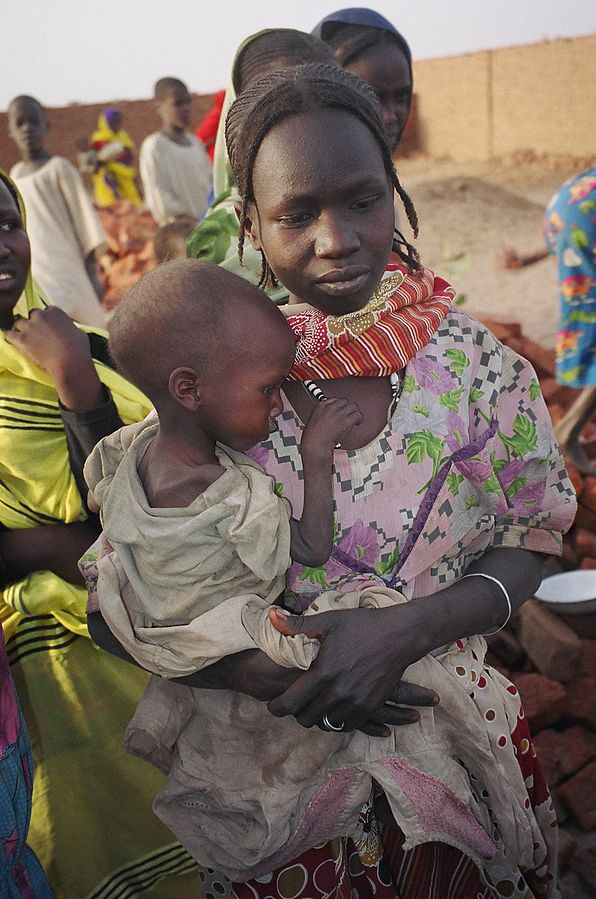Sudan – Darfur – South Sudan
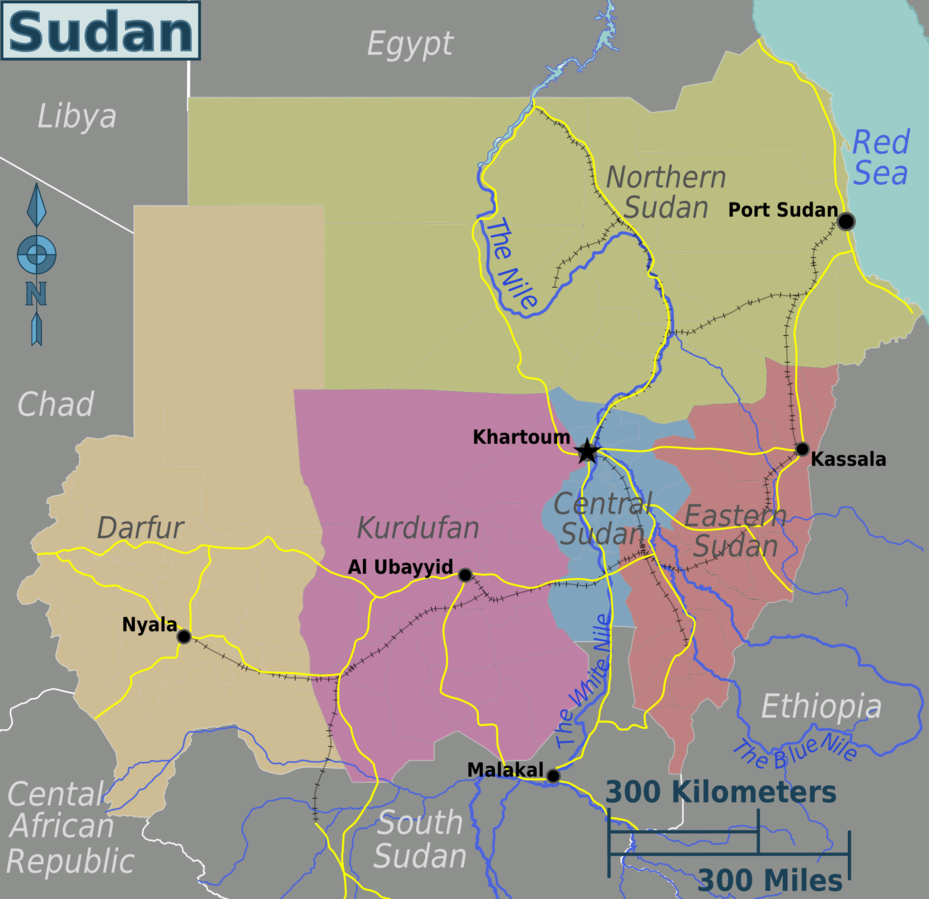
Map of Sudan with the Darfur region indicated in beige. Image courtesy of Peter Fitzgerald is unmodified and licensed under CC BY-SA 2.5.
Background
Sudan is the third-largest country in Africa, behind Algeria and the Democratic Republic of the Congo. For decades Sudan’s people have experienced civil war, genocide, drought, theft of the country’s natural resources, and autocratic governments.
There are several political regions in Sudan. North Sudan essentially controls the rest of the country. Darfur is a three-state area in western Sudan. In 2011, the south part of the country became independent as the new country of South Sudan.
Ethnic diversity has fueled some of the violence in the country. The government is controlled by the northern Arab minority, while the rest of the population is African. This division, Arab or African, is based on self-identification: on language, culture, belonging to specific tribal or family groups, and on livelihood patterns, yet nearly all Arabs and Africans in the North are Muslim in faith, and they all reside in Africa.
Since the end of British colonial rule in the 1950s, Sudan’s rulers have been members of the minority Arab population. Like most minority governments, these autocratic leaders have controlled through repression and violence.
North-South Civil War and Independence
Beginning in 1983, the northern government fought a brutal twenty-year civil war with the south. Over two million people were killed and four million more were displaced.
This conflict was largely portrayed in racial and religious terms: the Arab Muslim north against the black African, largely Christian and animist south. However, the conflict was essentially over control of the south’s resources – fertile land and oil.
The northern region is mainly desert, broken only by the Nile River corridor. The south includes grassland, swamps, and tropical forests – and oil. Fully 85% of Sudan’s oil is in the south. Sudan also has vast gold fields.
For some people in power, identity presents an opportunity to marginalize and disenfranchise certain groups. Hostilities between the Arabs in the North and Africans in the south and west led to the northern Arabs enslaving Africans. Although slavery was officially abolished in 1924, the Arab government continued to deprive people who were identified as Africans of an equal voice in government and of equal access to resources and opportunities.
The US became involved in Sudan during the civil war in the 1980s. As the death toll in the south rose to 2 million people, many of whom were Christians, Christians in the US contacted their elected officials.
By 2005, then-President Bush became involved. He ultimately led the Comprehensive Peace Agreement, the CPA, which called for the North and South to share wealth and power; for national elections; for democratic and military reforms; and for a semi-autonomous government in the South.
The South voted overwhelmingly for independence in 2011.
South Sudan in Crisis
Fighting in the South broke out almost immediately after independence. South Sudan’s president Salva Kiir and his ethnic Dinka supporters were pitted against Vice-President Reik Machar, who was aligned with Nuer people. Although this has been portrayed as an ethnic clash, like the face-off in the previous North-South civil war, it was ultimately a fight over power and resource control.
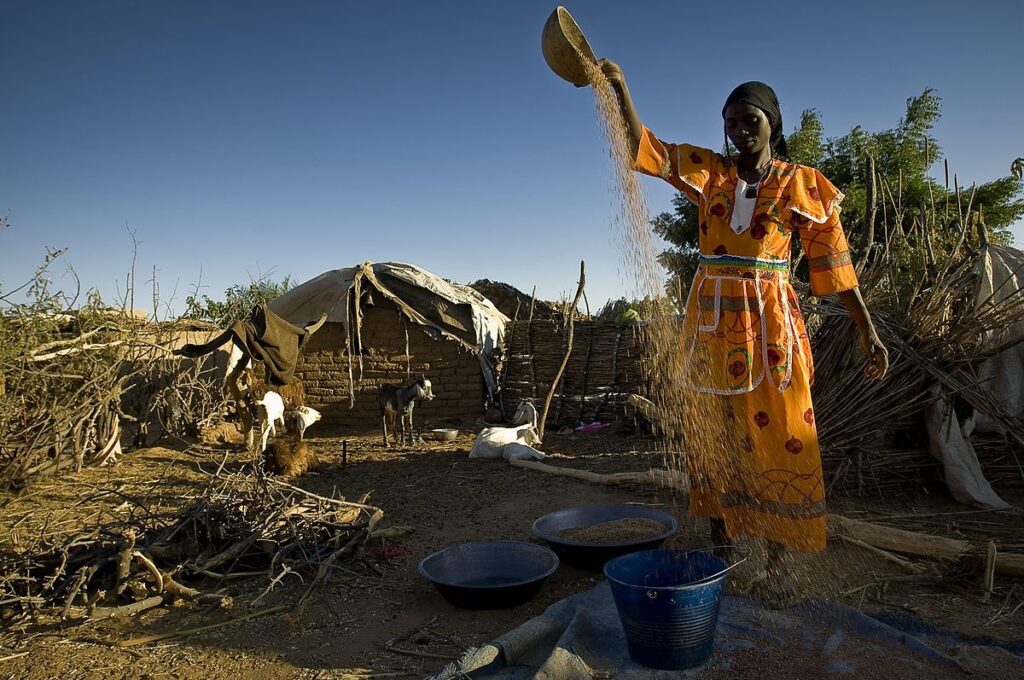
Image courtesy of European Commission DG ECHO is licensed under CC BY-SA 2.0.
In 2011 the United Nations Mission in South Sudan (UNMISS) entered South Sudan with 17,000 peacekeepers, in a mandate that was extended to March 15, 2024.
Violence in South Sudan has escalated tragically, with 800,000 internally-displaced people, 75,000 refugees, thousands of people dead, and 3.2 million people in need of life-saving assistance.
The Darfur Genocide
Darfur is a three-state regional area, about the size of Spain, in western Sudan. This is the site of a third Sudanese crisis.
In Darfur, the nomadic herders are Arabs. The settled farmers are Africans. At the local level, the conflict is about basic resources – both the Arab grazers and the African farmers need land and water. The Arab government wants the land from the Africans.
At the regional level, the conflict is portrayed as a tribal or ethnic conflict, with the government inciting Arabs against Africans. Viewing this conflict solely as a new tribal conflict is an unfortunate Western view of conflicts in Africa; these grievances are almost always the legacy and by-product of Western colonialism. This framing can perhaps explain why the crisis in Sudan is not garnering mass media attention and discussion – as similar framing and lack of mass coverage happened in the case of Rwanda and other conflicts and genocides in Africa portrayed solely as tribal or ethnic conflicts.
The national level is political. Oil is the resource that Sudan sells to get money for weapons, which in turn bring power and the ability to attack people and grab their land. Whoever controls oil and some of Sudan’s other resources gets the power.
In 2003, some African rebel groups attacked a government post in Darfur in a desperate effort to urge the government to provide roads, hospitals, and schools. The government responded with a genocidal campaign not only against the rebels, but against all non-Arabs in the Darfur region.
Since 2003, at least 300,000 innocent civilians have been killed in Darfur and more than 2.5 million people have been displaced from their homes and their villages. Towns that were viewed as African, and inhabited by Fur, Masalit, and Zaghawa tribes, were decimated.
Sudanese government planes bombed villages using Russian Antonov bombers. An Arab militia known as the Janjaweed, meaning ‘devils on horseback,’ enters a village to kill, torture, poison the wells, and burn the villages. While hundreds of villages were being burned down, the usage of racial epithets was common. Examples include “Kill all the slaves,” “Kill the Blacks,” and “We will kill all men and rape the women. We want to change the color.” These are examples of language that survivors recalled from the Janjaweed and government attackers as they burned villages and killed civilians.
The government recruits Arabs who are motivated by incitements of racial hatred, small amounts of money, and the government’s promise that they can take whatever they can find in the villages – including the women and girls.
The large weapons, such as the bombers, are bought from Russia; smaller arms are bought from China using money from oil sales.
This catastrophe has been going on since 2003, and deaths and displacement continue to escalate.
The United Nations had a hybrid peacekeeping force in Darfur called UNAMID, the United Nations Assistance Mission in Darfur, comprised of 25,000 troops from the African Union and the UN. UNAMID concluded in 2020, despite protests by people in Darfur that they would not be safe without the troops’ presence.
But it had been determined that the Darfur conflict was resolved. In place of the UN peacekeepers, the Sudanese government was charged with protecting civilians, delivering aid, and mediating any further conflicts.
Prosecutions for the Darfur Genocide
Efforts were in motion to hold the worst of the genocide perpetrators to account. In March 2005, the UN Security Council referred the situation in Darfur to the Prosecutor of the International Criminal Court.
The Court issued indictments against seven people accused of leading the violence.
On March 4, 2009, the Court issued an arrest warrant for Sudan’s president Omar Al-Bashir on 5 counts of crimes against humanity and 2 counts of war crimes.
The next day Bashir expelled 13 aid agencies, including Doctors Without Borders, the Red Cross/Red Crescent, and the UN World Food Program.
A year later, Bashir was indicted for genocide, the first sitting head of state ever indicted by the ICC as well as the first to be charged with genocide.
Although the violence and ongoing inequalities in Darfur remained unchanged, in 2017 the Trump administration revoked some U.S. sanctions against Sudan. He ended the 20-year trade embargo, lifted the asset freeze, and moved towards normalizing relations.
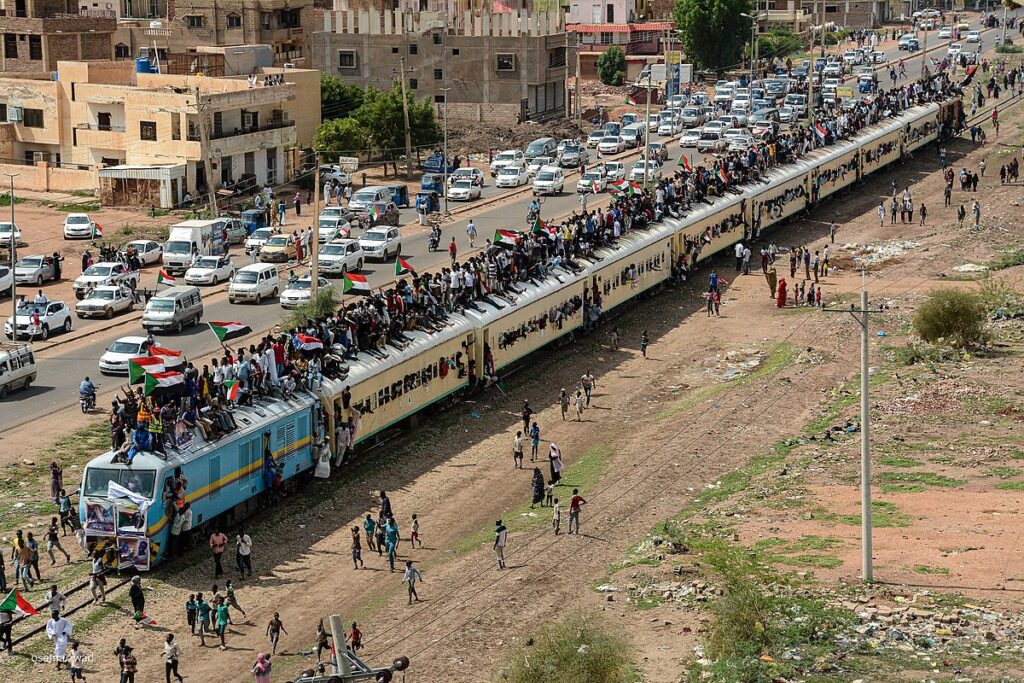
Image courtesy of Osama Elfaki is licensed under CC BY-SA 4.0.
Protests and a Coup
Massive citizen protests against Bashir began in December 2018 over rising bread prices. The protests morphed into calls for him to turn the country over to civilian rule.
Tens of thousands of pro-democracy protesters took to the streets of Khartoum, the capital, in early 2019. Bashir used his two closest generals to quash the uprising: General Abdel Fattah al-Burhan’s Sudanese Armed Forces, the SAF, and Gen. Mohamed Hamdan Dagalo (known as Hemedti) and his paramilitary troops, the Rapid Support Forces.
But in a surprise move, the two generals joined forces, turned on Bashir, and deposed him.
The generals formed a military-led transitional government and announced that it would rule for two years. They suspended the constitution and dissolved the government institutions. The people were told that Sudan would soon prepare for “free and fair” elections.
The announcement drew more protests.
After the Coup, 2019-2021
For the promised two-year period, 2019-2021, there was a degree of military and civilian power-sharing.
The situation shifted, however, in mid-April 2019, with increasing power going to the civilians. Al-Bashir and two others indicted by the International Criminal Court were imprisoned in Sudan, and the civilian prime minister, Abdalla Hamdok, agreed to transfer al-Bashir to the Court.
But the people demanded a complete end to military involvement.
On June 3, 2020, the UN Security Council adopted the UN Integrated Transition Assistance Mission in Sudan (UNITAMS), a follow-up to the then-defunct UNAMID. UNITAMS had a political mission to support Sudan for a transition to democratic rule. UNITAMS was renewed until December 3, 2023.
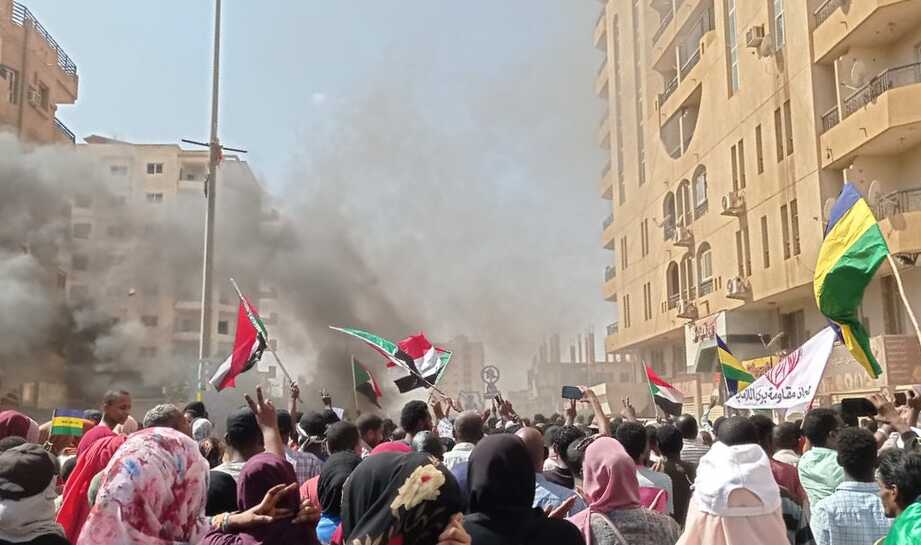
Image courtesy of Osama Eid is licensed under CC BY-SA 3.0.
Coup, October 2021
Suddenly, in October 2021, Al–Burhan and Hemedti jointly carried out a complete military takeover instead of moving to the promised civilian government.
Soldiers arrested Prime Minister Hamdok and other civilian ministers. The military took over state TV and radio headquarters and restricted the internet.
Burhan said elections would be held in July 2023.
2021 – April 15, 2023
Since the 2021 coup, protests continued but with heavy repression from the government. Hundreds of people were killed and nearly 6,000 were injured. People were also unlawfully detained, forcibly disappeared, and subjected to sexual and gender-based violence.
April 15, 2023
On April 15, 2023, fighting broke out in Khartoum and in Darfur between the two generals’ troops: Al-Burhan’s Sudan Armed Forces (SAF) against Hemedti’s Rapid Support Forces (RSF). Violence spread rapidly in the two generals’ battle for control of Sudan. Hundreds of people have been killed, and thousands are refugees or internally displaced. Hospitals have been bombed and key infrastructure, including power grids, is destroyed. The people face an unimaginable humanitarian tragedy.
Genocide in Darfur
Attacks in Darfur have escalated, and experts warn of ongoing ethnic cleansing and genocide.
April 15, 2023 – Present
Attacks in Darfur have escalated, and experts warn of ongoing ethnic cleansing and genocide.
Since April 15, 2023, half of Sudan’s population, or 25 million people, are in desperate need of humanitarian assistance and protection. Roughly 18 million people are facing acute food insecurity, with 8.5 million people acutely malnourished or struggling to survive and an additional 755,000 in famine conditions. It is predicted that in the coming months, 220,000 Sudanese children will die. Additionally, by October 2024 an estimated 2.5 million people could die from hunger-related causes, and at least 14 areas of the country are near famine, yet no famine declaration has been made. The healthcare system is near collapse and contagious diseases are spreading; meanwhile, over 70% of healthcare facilities in regions affected by the conflict are inoperable or closed.
Since April 2023, over 10 million people have been internally displaced and over 2 million refugees have fled to neighboring countries.
Fighting has been concentrated in the capital Khartoum. However, mass killings and displacement in Darfur have led to reports of ethnic cleansing.
The country faces complete economic and social collapse. Just under half of the population is unemployed and the Sudanese pound has lost at least 50% of its value. Internet and telephone access has experienced blackouts during which more than 30 million people had no access for over a month. At least 10,400 schools have been closed, leaving 19 million children without education. The United Nations has only received 17% of its requested $2.7 billion it has requested for Sudan. The UN calls the present situation in Sudan the world’s worst humanitarian crisis.
Devolution to Destruction
The current mass atrocities in Sudan are the inevitable result of several factors:
- The West’s failure to realistically assess the goals of the military and paramilitary leaders in Sudan and to naively trust their promise of a democratic transition.
- An inability to strengthen and support civil society.
- A withdrawal of multiple peacekeeping forces, placing vulnerable people at increasing risk.
- No effort to resolve local resource-based conflicts.
- Limited accountability for previous violence in the region.
- Inertia among regional mechanisms that could enhance peace, safety, and security, such as the African Union.
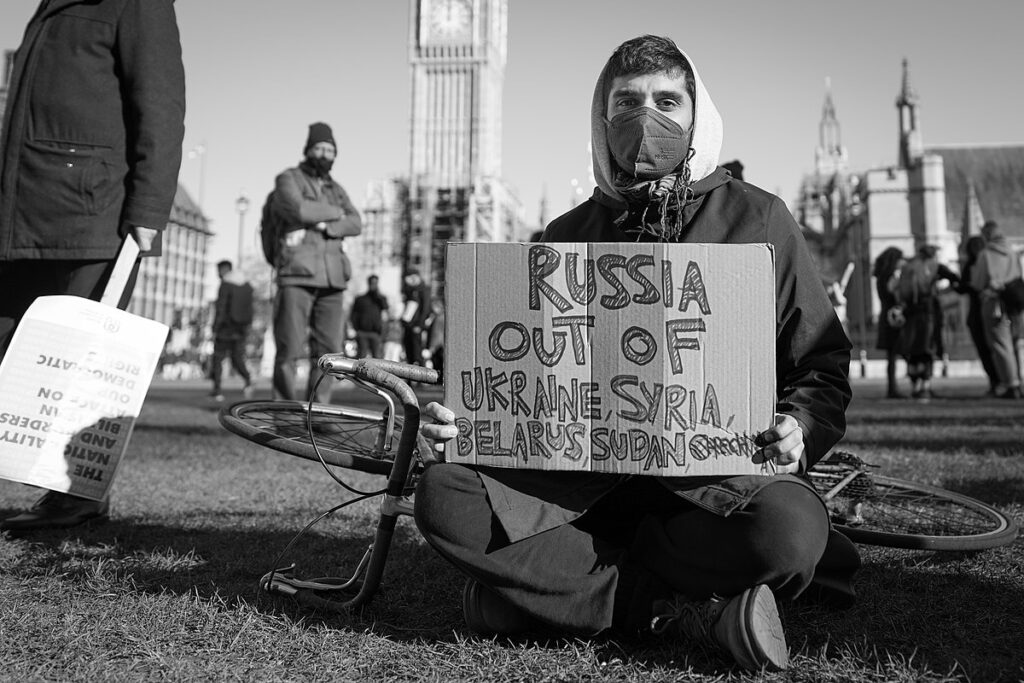
Image courtesy of Alisdare Hickson is licensed under CC BY-SA 2.0.
Russia in Sudan
Nearly every internal conflict regarding resources ultimately becomes internationalized, and both Russia and China figure in Sudan’s crisis.
Sudan is Africa’s third largest producer of gold. Russia is sustaining its war in Ukraine and surviving Western economic sanctions by smuggling gold out of Sudan. There have been at least 16 known Russian gold-smuggling flights out of Sudan since the Ukraine war began.
Russia has lent military backing to Sudan’s leadership to quash Sudan’s nascent pro-democracy civilian movement. U.S. officials affirm that Russia actively supported Sudan’s 2021 military coup. Documents show that both Hemedti and al-Burhan are backed by Russia.
Yevgeny Prigozhin, a Russian oligarch and one-time key Putin ally before his downfall and death (rumored to be by assassination), was at the center of these efforts. Prigozhin led companies that included the Wagner Group, a brutal paramilitary mercenary group linked to alleged torture, mass killings and looting in Syria, the Central African Republic (CAR), and Ukraine.
In Sudan, the company once headed by Prigozhin, Meroe Gold, extracts gold and provides weapons and training to both Sudan’s army and to the Sudanese paramilitary. The US and the EU have placed sanctions against Meroe Gold.
China in Sudan
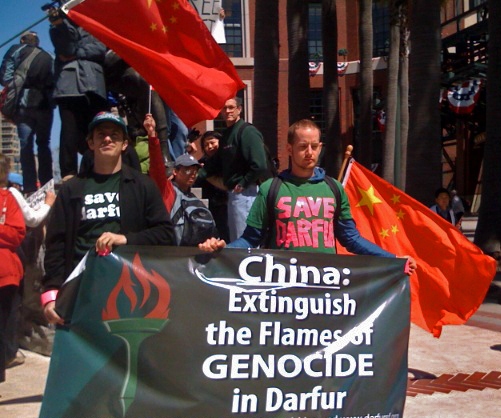
Image courtesy of Maria Chily is licensed under CC BY-SA 2.0.
Chinese leadership is worried about ambitious Belt and Road Initiative projects. China is Sudan’s largest trading partner, and more than 120 Chinese companies operate in Sudan.
China had controlled 75% of foreign investment in Sudan’s oil sector until 2018 but it has recently reduced its dependence on Sudanese oil. Instead, it is engaged in massive BRI infrastructure development of roads, railways, and bridges.
This conflict in Sudan poses a major geopolitical threat to China’s BRI plans.
Geographic Location
Another critical issue has to do with potential military bases on the Red Sea, a critical location for world shipping and a strategic military position. France, China, Japan, Italy, and the US have military bases in nearby Djibouti.
Sudan is strategically located to give access to the Bab al-Mandab Strait, through which 10% of all world shipping passes. The Economist reports, “The Kremlin’s main aim is to thwart a democratic transition in Sudan, because its ambition to build a naval base on the Red Sea is better served by a military government in Khartoum than the embryonic democratic one that was aborted by the junta’s coups.”
Conclusion
This is not yet a proxy war at present (2024), but it could easily expand to include other nations. Egypt is siding with the government, while Libya, the UAE, and Eritrea have supported Hemedti in the past.
This crisis in Sudan is a struggle for some of the world’s most valued resources, oil and gold; for power, especially through control of a desired seaport location; and the tragic vulnerability of millions of people caught up in a struggle exacerbated by the region’s increasing desertification.
Updated by Xander Cohn, August 2024.
References
“At least 7 dead as thousands protest in Sudan, demanding civilian rule,” CNN, https://www.cnn.com/2019/06/30/africa/sudan-mass-protest-intl/index.html
“At Least 750,000 on Brink of Starvation and Death in Sudan, Experts Warn,” The New York Times, https://www.nytimes.com/2024/06/27/world/africa/sudan-famine-starvation.html?pvid=b_EKi1liX7FZBdEBZI5wPq5z&smid=em-share
“Brutal Killing of Governor Heralds New Round of Violence in Darfur,” New York Times, https://www.nytimes.com/2023/06/15/world/africa/sudan-darfur-governor-killing.html
“Civil War in South Sudan,” Council on Foreign Relations, https://www.cfr.org/global-conflict-tracker/conflict/civil-war-south-sudan
“Crisis in Sudan: What is happening and how to help,” International Rescue Committee, https://www.rescue.org/article/fighting-sudan-what-you-need-know-about-crisis
“Darfur,” Holocaust Encyclopedia, https://encyclopedia.ushmm.org/content/en/article/darfur
“Death Toll from Sudan War Rises to More Than 600,” VOA News, https://www.voanews.com/a/death-toll-from-sudan-war-rises-to-more-than-600/7086508.html
“Ethnic violence in Sudan raises genocide alarm as war rages on,” Aljazeera, https://www.aljazeera.com/news/2023/6/13/ethnic-violence-in-sudan-raises-genocide-alarm-as-war-rages-on
“EU imposes sanctions on Sudan’s Meroe gold company,” Sudan Tribune, https://sudantribune.com/article271475/
“Fighting between Sudan military rivals enters a second day, with dozens dead,” CNN, https://www.cnn.com/2023/04/15/africa/sudan-presidential-palace-intl/index.html
“Food Security in the Horn of Africa,” UNEP Global Environmental Alert Service, https://na.unep.net/geas/newsletter/Nov_11.html
“How desertification is silently fueling conflicts,” DownToEarth, https://www.downtoearth.org.in/news/climate-change/how-desertification-is-silently-fueling-conflicts-66446
“How the West enabled Sudan’s warring generals,” CNN, https://www.cnn.com/2023/04/26/africa/sudan-generals-west-democratic-transition-intl/index.html
“Peacekeeping Mission in Sudan’s Darfur Ends,” VOA News, https://www.voanews.com/a/africa_peacekeeping-mission-sudans-darfur-ends/6200186.html
“Powell calls Sudan killings genocide,“ CNN, https://www.cnn.com/2004/WORLD/africa/09/09/sudan.powell/#:~:text=WASHINGTON%20(CNN)%20%2D%2D%20U.S.%20Secretary,rapes%20and%20burning%20of%20villages
“Racial Targeting of Sexual Violence in Darfur,” https://www.ncbi.nlm.nih.gov/pmc/articles/PMC2707480/
“Rival generals are battling for control in Sudan. Here’s a simple guide to the fighting,” CNN, https://edition.cnn.com/2023/04/16/africa/sudan-military-clashes-explained-intl/index.html
“Russia is plundering gold in Sudan to boost Putin’s war effort in Ukraine,” CNN, https://www.cnn.com/2022/07/29/africa/sudan-russia-gold-investigation-cmd-intl/index.html
“Security Council Extends Mandate of Assistance Mission in Sudan, Unanimously Adopting Resolution 2685 (2023),” UN Meetings Coverage and Press Releases, https://press.un.org/en/2023/sc15306.doc.htm
“South Sudan: Conflict and climate crisis drives rising hunger,” UN News, https://news.un.org/en/story/2022/11/1130152
“South Sudan Country Profile,” BBC, https://www.bbc.com/news/world-africa-14069082
“Stopping Sudan’s Descent into Full-Blown Civil War,” International Crisis Group, https://www.crisisgroup.org/africa/horn-africa/sudan/stopping-sudans-descent-full-blown-civil-war
“Sudan: 1985-2005,” Mass Atrocity Endings, https://sites.tufts.edu/atrocityendings/2015/08/07/sudan-2nd-civil-war-darfur/
“Sudan: Hundreds of Protesters Detained, Mistreated,” Human Rights Watch, https://www.hrw.org/news/2022/04/28/sudan-hundreds-protesters-detained-mistreated
“Sudan: Investigate the killings of people after military crackdown against protesters,” Amnesty International, https://www.amnesty.org/en/latest/news/2021/11/sudan-investigate-the-killings-of-people-after-military-crackdown-against-protesters/
“Sudan Crisis Explained,” UNHCR, 2 https://www.unrefugees.org/news/sudan-crisis-explained/
“Sudan in Crisis,” Origins, https://origins.osu.edu/article/sudan-darfur-al-bashir-colonial-protest?language_content_entity=en
“Sudan military finishes review of Russia Red Sea base deal,” AP News, https://apnews.com/article/politics-sudan-government-moscow-803738fba4d8f91455f0121067c118dd
“Sudan Situation Report,” OCHA, https://reports.unocha.org/en/country/sudan/
“Sudan’s army seizes power in a coup and detains prime minister,” The Guardian, https://www.theguardian.com/world/2021/oct/25/sudan-coup-fears-amid-claims-military-have-arrested-senior-government-officials
“Sudan’s military seizes power from President Omar al-Bashir,” Aljazeera, https://www.aljazeera.com/news/2019/4/11/sudans-military-seizes-power-from-president-omar-al-bashir
“The Comprehensive Peace Agreement,” Carnegie Endowment for International Peace, https://carnegieendowment.org/2011/01/04/comprehensive-peace-agreement-pub-42223
“The military has taken over in Sudan. Here’s what happened,” CNN, https://www.cnn.com/2021/10/25/africa/sudan-coup-explained-intl-cmd/index.html
“Trump Administration Formally Lifts Sanctions on Sudan,” New York Times, https://www.nytimes.com/2017/10/06/us/politics/trump-sanctions-sudan.html#:~:text=WASHINGTON%20%E2%80%94%20The%20Trump%20administration%20announced,region%20that%20once%20inspired%20protests
“UNAMID fact sheet,” UN Peacekeeping, https://peacekeeping.un.org/en/mission/unamid
“Will Sudan war cast a shadow on China’s BRI projects in Africa and the Arab world,” The Economic Times, https://economictimes.indiatimes.com/news/international/world-news/will-sudan-war-cast-a-shadow-on-chinas-bri-projects-in-africa-and-arab-world/articleshow/99767961.cms



